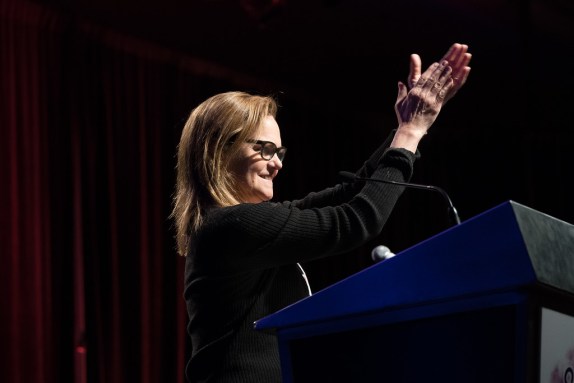TCG executive director Teresa Eyring at the TCG18 closing plenary. (Photo by Jenny Graham for Theatre Communications Group)
Just before I began as TCG’s executive director in 2007, I was working on my very first American Theatre column, in which I reflected on leaving a place I’d been for a long time—and specifically, what would I do with the boxes and boxes of theatre programs in the basement? Moving from a small house in Minneapolis to a tiny New York apartment meant downsizing; it also evoked lots of memories of my experiences as part of that amazing theatre scene. I sent a draft to Minnesota-based playwright Jeffrey Hatcher to get his feedback. He wrote back to me: “I wouldn’t change a word.” Phew! Column submitted.
Another Twin Citian and dear friend, Dipankar Mukherjee, had some clear advice on a different front. He said: “When you get to TCG, you need to aim for transformation in the field. And it’s more than just ‘changing the font size.’”
When I think about these nearly 17 years at the helm, I find myself reflecting in a full-circle space. In 2007, the U.S. economy was inching toward a crash that would affect theatres deeply, and force them to make choices they’d never made before. We spent a good amount of time collectively considering potential impacts, asking questions, and sharing what we were learning. The perspective of some thought leaders was that we would see a decimation of the theatre field altogether—that there would only be some left standing. Thankfully, that didn’t happen.
At the same time, there were some opportunities. Technology was rapidly advancing: Facebook had recently opened to the public, Twitter had emerged, Kindle and smartphones were gaining ground. Netflix was also well on its way from being a DVD mailing service to becoming an original content creator and streamer. TCG hosted several conference calls for interested theatre folk to learn how to access these platforms and use them for communications, marketing, and more. We were early adopters as a field, and many theatres were able to stay afloat through less expensive, more effective communications with their audiences and other stakeholders.
TCG was also part of coalitions to get the arts included in the American Recovery and Reinvestment (ARRA) Act of 2009, and $50 million was awarded via the NEA for “shovel ready” projects that could help kickstart the economy. Shovel ready meant activities that could begin immediately for economic impact, especially job creation/preservation.
By the 2011 TCG National Conference in L.A., things were starting to feel more stable again. There was even a sense of optimism that inspired us to theme our conference “What If?…” and to call for a series of “Whatifestos.” Larissa FastHorse offered hers: “What if…being a Native American female playwright were no longer exotic?” Kristin Shumaker queried: What if…neuroscience in theatre became a useful tool instead of a novelty?” Jacob Padrón proposed: “What if…the theatre field sought transformation?” And there were many more. (I highly recommend seeking out those speeches on Vimeo.)
That same year, the board, leadership, and staff of TCG entered a strategic planning process in which we named equity, diversity, and inclusion as a core priority. The specific programs and actions that came in the early years of that plan helped move the needle toward addressing structural racism and intentionally advancing greater equity, including the EDI Institute, the Legacy Leaders of Color Video Project, the SPARK program, and the Young Leaders of Color (since revised to Rising Leaders of Color). A decade later in 2021, we revised our mission to “to lead for a just and thriving theatre ecology.”
As I prepare to leave TCG, we are in an even more challenging period of change. Theatre and its people are experiencing an unsteady return in the post-pandemic-lockdown world. Technology, social media, and now AI have exploded, offering new opportunities as well as more competition for people’s time and attention.
Still, our art form continues to be differentiated by its aliveness. And it feels like an excellent time to ask that question again. What if…?
It’s also a time to welcome a new generation of leadership. This is my last column for American Theatre as TCG’s ED/CEO. I am taking a sabbatical before my departure from TCG at the end of June. I am excited by the announcement of Karena Fiorenza as interim CEO and LaTeshia Ellerson as interim Chief Growth Officer. You will be hearing from them!
I want to thank you all for being a remarkable network of visionary theatremakers, dreamers, and supporters. You are magnificent in your creativity, your resilience, and your commitment to the communities you serve.
Bringing it all full circle, I shared this column with Jeffrey Hatcher before presstime. He responded immediately with: “I wouldn’t change a word. But I would allow yourself a bow.”
I’ll see you at the National Conference in June!
